- Home
- Brian Hodge
Dark Advent Page 6
Dark Advent Read online
Page 6
The last time anything had hit her as hard as that last dream, the damage out there in the world had already been done.
Jeez, I’m sitting here listening for the first bulletins of some catastrophe. I feel like one of those people who goes to the Indy 500 just to see a car wreck.
The best she remembered, “the curse” (which was also what her paternal grandmother called menstruation…kind of cute, Erika thought, in an antiquated sort of way) had set itself upon her as she was embarking upon the transition from girl to woman, with her hormones in screaming imbalance, with one breast growing at a faster rate than the other. The first major episode had come when she was nearing the end of her fourteenth year, not quite eight years ago.
An especially nasty series of nightly dreams had plagued her, showing her a setting not much different from pictures she’d seen of Nazi death camps, except the setting was more like a jungle. Only coincidence (or was it more than that?) led her to figure it out before the fact. She learned from a Newsweek magazine that a disturbed man named Jim Jones had led a bunch of followers to a place called Guyana, and that a particular Congressman was planning a visit.
She’d phoned the Congressman’s office a few times, deepening her voice to sound older and more authoritative. At first politely listened to, she was finally dismissed as a nut case and handled accordingly. The worst of it was that she didn’t much blame them. Perhaps it was instinct that had prompted her to give them a false name and address. When nearly everybody turned up dead, she knew they’d come looking for her with an endless list of questions they’d want answers to.
“How’d you know?” they would’ve asked her. “How did you know?”
“You got me,” would’ve been her answer. “It just happens when I’m asleep.”
“But how?”
“IT JUST HAPPENS AND I WISH TO HELL IT WOULDN’T!”
The hit parade kept coming, once a year, maybe twice. For the week prior to January 13, 1982, she’d dreamed of a plane caroming off a bridge to sink like a stone in the icy Potomac, half-frozen survivors struggling feebly in the shattered crust of the river. She’d even gotten a good look at an unknown hero who time after time helped others latch onto a rescue line before slipping under the surface, down into an obscure and lonely death.
Industrial accidents were another hot item. India, late 1984: Union Carbide. The Soviet Union, spring, 1986: the Chernobyl nuclear accident. Perhaps she was the only person in the Western World who knew just what a crock those minimized casualty reports coming out of Russia really were.
Maybe the ability itself wasn’t the curse. More likely it was the impotence to do anything that made a difference, the psychically standing by to watch while people died. And the difficulty in distinguishing between events that had yet to come from events she’d tapped into at the moment of occurrence.
She supposed she’d kept her family from a certain amount of harm, and that in itself was some comfort, but not as much as she thought it should have been. It was too easy to say, “Dad, don’t park on the fifth level of the garage at work today,” or warn her brother Cal, “Don’t run hurdles at track practice tomorrow.” Easy, no sweat. And they avoided those situations, half-believing and half-humoring her. But they never thanked her. She was no heroine, only a family member with an uncanny knack for good guesswork. Dad, Mom, Cal…they never knew what lay in the path of a different decision. And usually she didn’t either, because the little things were mere hunches inside, bad feelings lingering like a sour aftertaste.
On the radio, an open line gave way to the CBS network news at midnight. The high point was an update on the Pope’s ongoing tour of a little cluster of Communist-bloc countries. Hardly a matter for concern. Nothing out of kilter with the world at large. So far. Maybe it’ll take a little time, she thought. And maybe if I turn off the radio and go to bed and refuse to think about it, it’ll go away and not bother me…ever.
If only the dreams weren’t so damned cryptic at times, if only they made more sense, if only they spelled things out more clearly. Yeah…if only, if only. You could spend a lifetime prefacing statements with those two words. A phrase of failure and regret.
purplish blotches massing on her face and arms
Where was the connection? She felt it close enough to touch, on the tip of her tongue.
The rustle of familiar feet in the hallway…Frank Jennings walked into the kitchen, bare-chested and in pajama bottoms, his stubbly face set against the light in one giant squint. He eased into a stool next to Erika at the bar.
“What gets you up at this hour?” she asked.
“Your mom kicks in her sleep sometimes. I woke up and saw the light. Figured it was you.” He winked. “Call it father’s intuition.”
“Great, but I’ve been up for forty-five minutes.”
“So my intuition’s a little slow.” Frank massaged his high forehead, the bridge of a nose slightly flattened from his boxing days in college. “Is there, uh, anything…?”
Erika shrugged. “I woke up from a bad dream is all.” And that’s all I’ll say because by now you ought to know the rest.
He reached over to rub her shoulder, and she closed her eyes and leaned slightly into it. Unspoken gratitude brought a little smile to her lips. Years ago, when it became impossible to deny that Erika was no longer a little girl, he’d suddenly found it difficult to touch her, even in the most innocent of expressions of affection. She figured it out, in time, because she’d always been quite good at divining the unspoken, but it remained an imposing wall between them. Until it finally, for whatever reasons, began to erode away. And things were good again…comfortable. It remained a viable lesson in the way that no real relationship ever stays static, without evolving for better or for worse or into something different.
“Why don’t you just go on back to bed, Rikki.” His all-purpose cure. “It won’t do you any good to sit here and wonder and worry.”
“Probably not,” she said, rolling the empty juice glass between her palms.
Frank smiled gently and shook his head. “I know you’ve got a little something extra upstairs.” He tapped his temple for emphasis. “I don’t understand it, but I know it’s there. But don’t get to the place where you depend on it.”
Depend on it? she thought. I’d lock it in a steel box and drop it in the Mississippi if I could. She felt compelled to shout that out to him, set his thinking straight once and for all. But no, she wouldn’t raise her voice to him. Her mother, likely, but not him. Not Frank Jennings, all-time great Rational Man, champion of truth and logic, holder of the almighty CPA license. Because he, at least, wouldn’t deny the facts and refuse to speak of it. Picture her mom in here at a quarter past twelve, checking up on her and what had driven her from her bed. Oh, what a laugh that was.
“Go to bed,” Frank said after standing up, and then he kissed her atop the head. He disappeared toward the bedrooms, swallowed by the shadows in the hallway.
Go to bed? Maybe later.
For now, she was content to sit in the sparsely lit kitchen, staring at the tiny crescent of juice that clung stubbornly in the bottom of her glass. Wondering if she’d ever have a normal life. If she’d ever meet a man who could understand her strange knack (curse) and its sometimes awful implications. Understand it? Why, she’d be overjoyed at running across someone who might even go so far as to merely accept it. Forget understanding. But so far the track record had been a poor one. Not that she’d ever sat down and spilled out the story…a sure way to send a guy backing out the door in retreat. No, they all seemed to have a sixth sense of their own, sometimes kicking in before they’d bedded her, sometimes after. Sometimes they bedded her anyway, another pubic scalp to dangle from their belts, before dropping the bomb on her. That somehow things just weren’t right between them. The reasons varied, but the common denominator was always the same: that wary look in their eyes. You get to recogni
ze it right away after a while.
It had probably been the better part of a year since she’d last accepted a date.
Erika wondered when, if ever, she would muster up enough courage to forge ahead into life on her own, instead of hiding where she’d grown up, safe and protected. She had the brains, she knew that. But good old-fashioned guts were something else entirely. And if you’re so smart, Erika dear, why don’t you at least start by picking up some vibes about a better job in the classifieds?
She rinsed her glass in the sink sometime around twelve-thirty (mustn’t leave a sticky glass for Mom in the morning, oh no) and returned to her bedroom long enough to slip into some clothes…jeans and sandals and a denim shirt, faded all the way back in her days of trying to earn a psychology degree. It was the most comfortable shirt she owned, and whenever she wore it she knew that children never truly abandon those snuggly blankets and quilts that bring them so much comfort when they’re little…they just trade them in for favorite clothes when they get older.
She relaxed more when she was out in her car, rolling south on Bellefontaine out of Spanish Lake and into St. Louis, the nonstop talk on KMOX forgone in favor of some jazz on a station she didn’t know. But that music was just what the doctor ordered. Immersion in the city, which, like New York, never truly slept, made her feel anonymous. Fine by her. Now she was just like everybody else.
Normal.
She cruised until she found a theater playing an all-night string of horror films. At this time of night, it seemed that the only marathon showings were of horror flicks or triple-X epics. She had no objection to the latter, but alone and at this hour, she’d probably be better off with the gore.
The theater held a sparse population of other insomniacs, mostly solo or paired off with one other fellow zombie. Erika’s sandals met with faint resistance every time she tried to pull them from the tacky floor, until she settled in a seat that had seen better days before it had seen the business end of someone’s knife. She came in on the beginning of a gruesome little movie called The Hills Have Eyes, mean-spirited but engrossing nonetheless. The next movie followed shortly after three…one of those old Roger Corman adaptations of Edgar Allan Poe, this one The Masque of the Red Death.
To a girl who had seen as many movies as Erika, the old sets of this film seemed so contrived, so out of date. So tacky. But she found it fascinating the way Vincent Price and the rest of his partying fools had decked themselves out in their gaudiest clothes, spitting in the face of Fate, until…
…the Red Death held illimitable dominion over all.
Erika watched, dumbstruck, as they began the Dance of Death, and a woman draped in all her finery was streaked with scarlet stains popping out across her skin.
Déjà vu.
purplish blotches massing on her face and arms
In an instant she knew what her dream had meant. What was to come, if it wasn’t already walking among them all, a truth more terrible and more agonizing than any fiction had ever dreamt of being.
Erika fled the theater, barely able to hold back the tears until she’d reached her car.
8
Some thirty-eight hours after an eleven-year-old named Chuck had met the worst bogeyman of his old childhood fears, and Erika Jennings awoke to oppressive darkness in her bedroom, Jason got mugged at a locale somewhere between the two of them.
It was June twenty-fifth, the last Thursday of the month, and it started out innocently enough, if not quite normal. Upon arrival at work, Jason was informed by Kelly about a truckers’ strike in St. Louis that had left a shipment of suits and rental tuxes stranded at the wholesaler with no way of moving east of the river on their own. Would Jason be interested in finding a little something extra in his next paycheck for cruising over in the store van and hauling them back? Is the Pope Catholic?
Kelly warned him that he’d likely have a little layover time, since a number of other stores were probably doing the same thing.
“So what should I do in the meantime?” Jason asked, already loosening the tie he’d knotted ten minutes earlier.
“Get a haircut. You’re starting to look like a sheepdog.”
“Better than being a bald old fart like you.” Jason grinned.
Kelly’s wholesaler was on the south side of St. Louis, within sight of I-55 as it wove south. Beyond the highway ran the Mississippi, brown and eternal. Jason found he’d have a wait of at least forty-five minutes, and so he left his van keys with a fellow who toted around a clipboard as if it were nothing less than the Ten Commandments. Jason set off on foot in search of a diner to grab a more substantial breakfast than the coffee and crunch donut he’d gulped down in his kitchen.
As he walked a southwestern path, he tried to reconcile the city as it was now with what it had been a century and more ago, a vital cog in a blossoming nation, bustling with steamships and rivermen, merchants and whores and thieves who’d slit your throat for the change in your pocket. But then came the railroads, and like the country, the city had never been the same. Now? Now you had cars and buses farting their fumes into the air of a city populated by folks hard-pressed to know their heritage, looking forward and never backward. You had land to the near west poisoned by dioxin. Progress? The city had grown up but had lost its peculiar innocence of those long-ago days. Jason wondered what it would be like to step back in time and see it as it had once been. Those grimy days of yesteryear.
He found his diner, ate his bacon and eggs, paid, and left. Took a shortcut through an alley, passing a long building that looked like a dormant warehouse. The mouth of the alley and the view to the other end reminded him of a gauntlet, but he figured it was probably safe enough during the day. And maybe it would’ve been, had he been dressed in something other than tan slacks, a brown shirt, and a tie. The clothes had pegged him from the word go, and he stood out like a lone beacon.
It happened when he was three-quarters of the way through the alley. He heard nothing more than a single footstep grinding down on gravel, and before he could turn to see what was coming, he felt his shoulders seized in a pair of strong hands. They shoved him into the bricks of the warehouse, where his head smacked hard enough to open a gash up the right side of his forehead. His knees buckled and his hands clutched at the crevices between bricks for support. His ears rang with the sickening crunch his skull had made.
The alley swam into view as his eyes cleared, as he straightened with his back to the wall. His attacker was younger by maybe a couple of years, wearing a faded denim jacket with the arms ripped away; his cratered cheeks were ravaged with acne. The switchblade came out then, handled as easily as if it were the first thing the guy had ever found in his crib.
“The wallet,” he said flatly.
Just like being around an animal, Jason told himself. Don’t let him know you’re afraid. He felt blood matting his hair, oozing down his cheek to his chin, dripping onto his shirt.
The knife flickered nervously. “Hand it over, asshole.”
Jason stared into his eyes, feral eyes. “I left it in my car.”
“Lying motherfucker!” the mugger yelled, launching himself forward, the knife leading the way in a wide sideways arc.
Jason didn’t know he’d even moved until he found himself a yard away, watching that blade slash across the space where his stomach had been a second before, and then dig into the brick wall. The blade snapped off at the hilt, glittering as it fell to the alley. He stared at it, realizing that if he’d been any slower, he would by now be curling into a fetal ball, trying to hold in his guts.
The mugger was as quick as a jaguar. Jason caught his booted foot in the stomach, and at least a pair of two-fisted blows came slamming down on his upper back. He tasted the alley and felt his wallet yanked from his hip pocket, heard the pocket rip as the mugger tore it half away, leaving it hanging in a flap. Fading footsteps.
Jason got to his knees
and lost his breakfast beside the wall. He winced and swore as he moved so as to sit with his back to the wall, waiting for the outrage in his ribs, his head, his back to quiet down.
He wiped blood from his eye, remembering what he’d thought of less than an hour earlier, the days of the steamboats, and cutthroats who’d carve you like a ham for whatever was in your pockets. People weren’t much different now as then, it seemed. A city, a nation, a world can grow as sophisticated as a society debutante, but human nature wasn’t going to change.
A few minutes later, he watched a scroungy little mutt come sniffing down the alley, tail wagging when it saw Jason and wandered over. Dopey little thing. Its coat was brown and black and white, all dirty. No collar, of course. It might’ve been part terrier, but it was definitely a melting pot of many breeds.
And it looked about as forlorn as Jason felt at the moment.
“Come here,” Jason said softly. He snapped his fingers, noticing for the first time the nasty scrape along the back of his hand. “Come here, girl.”
The dog wandered over the rest of the way, tentatively approaching him at first, then snuggling in close. He stroked it absently, wanting to cry at the violation of body and mind he’d undergone, and then he scooped the dog up in his arms and hugged it. Its rough pink tongue lapped out on his forearm, licked his wrist, licked the scrape on the back of his hand. He held it and pressed his face close to its body as if it were a comforting angel come down in the humblest of forms.

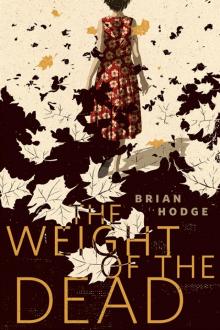 The Weight of the Dead
The Weight of the Dead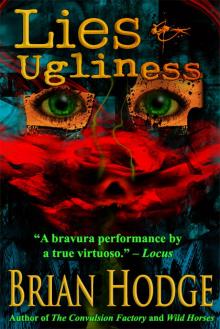 Lies & Ugliness
Lies & Ugliness The Convulsion Factory
The Convulsion Factory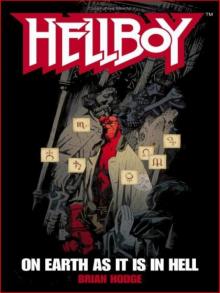 Hellboy: On Earth as It Is in Hell
Hellboy: On Earth as It Is in Hell Whom the Gods Would Destroy
Whom the Gods Would Destroy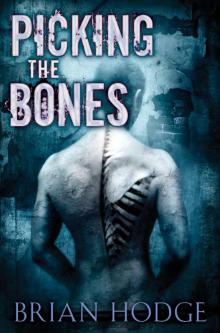 Picking the Bones
Picking the Bones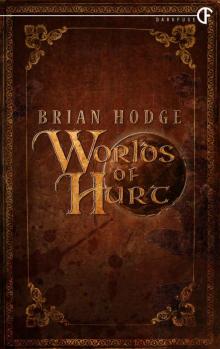 Worlds of Hurt
Worlds of Hurt Oasis
Oasis Nightlife
Nightlife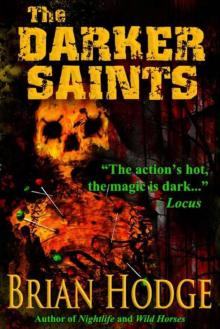 The Darker Saints
The Darker Saints Just Outside Our Windows, Deep Inside Our Walls
Just Outside Our Windows, Deep Inside Our Walls A Haunting of Horrors, Volume 2: A Twenty-Book eBook Bundle of Horror and the Occult
A Haunting of Horrors, Volume 2: A Twenty-Book eBook Bundle of Horror and the Occult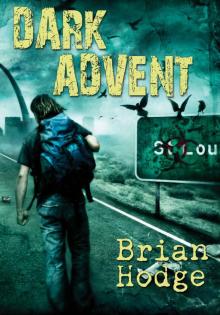 Dark Advent
Dark Advent Mad Dogs
Mad Dogs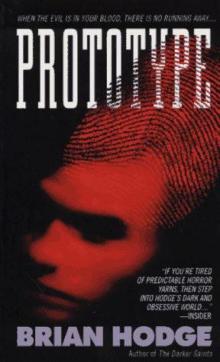 Prototype
Prototype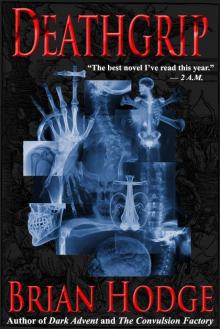 Deathgrip
Deathgrip Falling Idols
Falling Idols